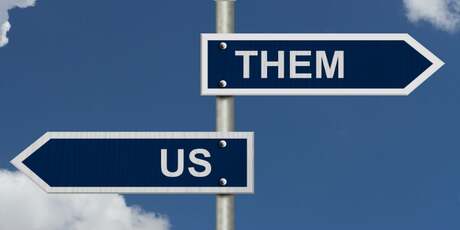
For me interreligious dialogue is a way of doing that – a small way but hopefully an effective way, a pebble in the pond that will have ripples elsewhere. This is what some of us were trying to do last Saturday when we arranged to have a neighbourly walk around the different places of worship in the west end of Glasgow. It had come about at a lunch that some friends from the local church, mosque, synagogue, mandir and gurdwara had shared with the Jesuit community in our area. We planned the walk as our contribution to Scottish Interfaith Week and expected it to be a fairly quiet affair with no one faith taking the lead. Ninety-six people turned up and spent several hours and 12,000 steps for those who count such things walking together, enjoying the chat as we went from place to place, being warmly welcomed by our hosts and listening to a story about their faith. This was the first time most of the participants had taken part in such an event and the first time they had visited these places of worship. They were delighted with the experience and called for more opportunities to do it again. Many of them commented on the warm welcome they had received from every faith community and a sense of enjoyment at feeling at home in places of worship so different from their own. Some are even thinking of doing something similar in the south side of the city.
The event was mentioned in a national newspaper by a journalist writing a piece on antisemitism but unfortunately there were some errors in the article which was entitled “Glasgow’s multi-faith march was an antidote to hate”. Hopefully it was an antidote to hate as people got to know one another as neighbours and friends. During our little pilgrimage I was aware of marches within the city which were calling for peace in the Middle East but identifying with one side rather than the other through the placards and flags they were carrying. I had a sense that what we were doing might be a better contribution to peace, at least in our own city as it witnessed to unity rather than polarity. But it was not a march. It was a neighbourly walk and had been planned before Hamas attacked Israel on 7th October and was not “rooted in a desire to express empathy and provide comfort for Glasgow’s Jewish community”. It was indeed “a means of signifying hope, love and optimism” and rooted in a desire to overcome prejudice and ignorance. I’m sure some people would have expressed sympathy and concern to the Jews on the walk, but some would also have expressed that to the Muslims on the walk who have a loyalty and sympathy with the Palestinians living in Gaza and suffering Israeli bombardment. As people of faith, desiring peace we would have had our own sympathies and loyalties. The article, I’m afraid has caused some concern within the Muslim community and has led to some feeling the walk was used for political purposes and in danger of stressing the polarisation that we were trying to avoid.
This shows that dialogue and good relations don’t come easily and must be negotiated. Sometimes it feels like walking on eggshells. However, misunderstandings and upsets can be beneficial if they bring people together to dialogue about difficult issues in a safe space. Interfaith Glasgow and the Council of Christians and Jews recently did this by bringing Christians and Jews together to reflect on antisemitism, especially in relation to Israel and Palestine. Sometimes the dialogue was difficult, but it was honest and worthwhile. Perhaps this is the moment to do the same for Jews and Muslims. Pope Francis has said that interreligious dialogue is a gift of inestimable value. Surely this would be true if it was possible for our Jewish and Muslim sisters and brothers to be honest and open with each other about Israel/Palestine. Perhaps this will be a legacy of our interfaith pilgrimage.


 RSS Feed
RSS Feed
